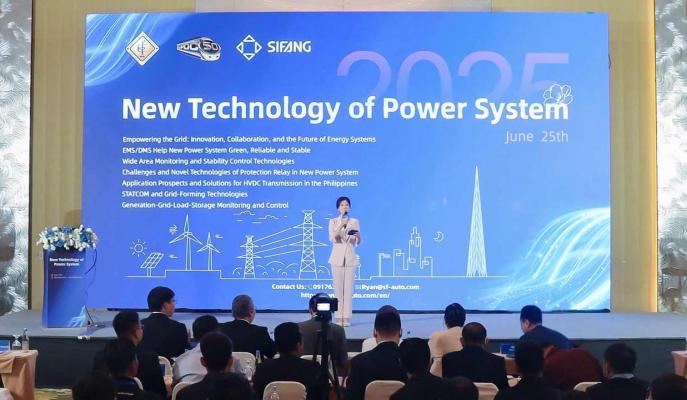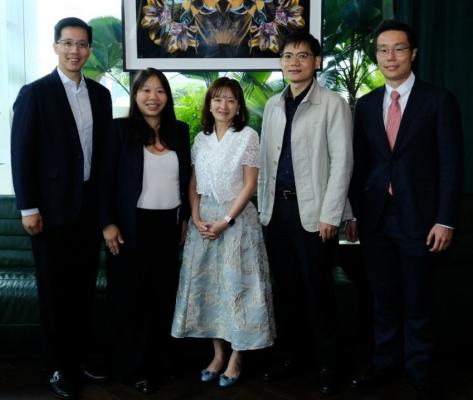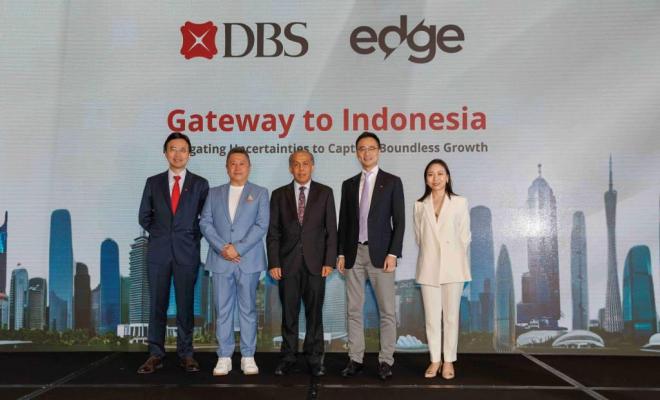- Home
- MediaOutReach
- Passing the Torch to a Trillion-Dollar Future: The 4th China Next-Gen Entrepreneurs Forum Redefines Private Enterprise Succession
Passing the Torch to a Trillion-Dollar Future: The 4th China Next-Gen Entrepreneurs Forum Redefines Private Enterprise Succession
Jumat, 27 Juni 2025 | 19:49

Jerry Lu delivered an inspiring keynote at the 4th China Next-Gen Entrepreneurs Forum, sharing his journey and insights on generational succession.
HONG KONG SAR -
Media OutReach Newswire
- 27 June 2025 - Amid an era of unprecedented generational
transformation, The 4th Forum of the New Generation of Entrepreneurs
kicked off on June 17 in Beijing, sparking a groundbreaking dialogue on
the future of private enterprise succession in China. Jerry Lu, Chairman
of Jinshang Technology Group, set the stage with a powerful and
inspiring keynote titled
"Carry on the Second Half,
Writing a New Chapter " captivating the audience and setting the tone for this pivotal event.
The event brought together over 1,000 participants, including distinguished experts such as Ji Weimin, Deputy Director of the Institute of Industrial Economics at the Chinese Academy of Social Sciences and President of China Business Journal, Prof. Peng Qian, Director of Roger King Center for Asian Family Business and Family Office at the Hong Kong University of Science and Technology, along with representatives from the new generation and private enterprises.
Bridging Generations: From Conflict to Understanding
Jerry Lu's keynote began with a personal story of accompanying his father on a business trip at age 12, planting the seed of his desire to one day stand shoulder-to-shoulder and lead alongside him.
Jerry Lu reflected on the complexities of generational succession, sharing his personal journey of transformation—from feelings of frustration to a deep sense of understanding, and from reluctantly inheriting a legacy to actively embracing it. He likened the first generation's contributions to a powerful "threefold fuel"—resources, experience, and spirit—that not only provide a foundation for the next generation but also serve as a launchpad for bold innovation and future growth.
Turning Challenges into Opportunities: 68% Attrition vs. 71.2% Survival
Jerry Lu highlighted critical insights into the generational succession crisis, revealing that 68% of successors forced into leadership roles leave within three years, and only 3% of such businesses survive beyond five generations. In contrast, businesses led by proactive successors boast a remarkable 71.2% survival rate over three generations, underscoring the importance of intentional, forward-thinking leadership transitions.
To address these challenges, Lu outlined five strategic pathways for successful succession: cultural governance, technology-driven transformation, digitalization, industry upgrades, and cross-sector integration.
As a testament to these principles, Lu shared his own approach—leveraging the TOJOY's Platform to build a comprehensive health and legacy service platform tailored for high-net-worth clients. This integrated innovation model not only harnesses the resources and networks of previous generations but also positions businesses for sustainable growth in a rapidly changing landscape.
Academic and Media Perspectives on Family Business Succession
Ji, a seasoned media expert, shared insights from a decade of research on over 2,000 family businesses across China, identifying three pivotal shifts essential for successful succession. The first shift urges the next generation to move beyond the passive role of "inheritors" and embrace the proactive role of "co-creators," taking responsibility for driving innovation and growth. The second shift emphasizes the importance of utilizing professional tools, such as insurance and trusts, to effectively protect and transfer family wealth. The third shift highlights the need to establish a sustainable ecosystem by integrating financial tools, family culture, and legal frameworks.
Building on this perspective, Prof. Peng Qian shed light on the growing trend of family businesses transitioning into family offices. She emphasized that the longevity and success of family enterprises rely on shared values, a long-term vision, and strategies focused on creating impact. As family businesses confront challenges like a shortage of successors and intergenerational conflicts, family offices are emerging as a vital solution. These offices not only manage wealth but also foster family unity and uphold values through philanthropy, education, and social impact investments. Peng stressed that this transition is essential for preserving family legacies while ensuring their growth and relevance in an ever-evolving business landscape.
An 84 Trillion Yuan Shift: From Family Mission to National Legacy
Over the next 30 years, approximately 84 trillion yuan in private wealth will transition to the next generation, shaping the backbone of China's economy. This forum, blending academic research, media insights, and practical case studies, presented a bold new blueprint for succession. With private enterprises contributing over 50% of tax revenue, 60% of GDP, 70% of technological advancements, 80% of employment, and more than 90% of all businesses, the next generation's responsibility extends far beyond their families—it is deeply tied to the nation's future. As Jerry remarked, "We inherit a legacy forged by our predecessors' perseverance, and we write a new chapter under the banner of national rejuvenation."
A new era of collaboration, innovation, and shared responsibility has begun, paving the way for the future of China's private economy
The event brought together over 1,000 participants, including distinguished experts such as Ji Weimin, Deputy Director of the Institute of Industrial Economics at the Chinese Academy of Social Sciences and President of China Business Journal, Prof. Peng Qian, Director of Roger King Center for Asian Family Business and Family Office at the Hong Kong University of Science and Technology, along with representatives from the new generation and private enterprises.
Bridging Generations: From Conflict to Understanding
Jerry Lu's keynote began with a personal story of accompanying his father on a business trip at age 12, planting the seed of his desire to one day stand shoulder-to-shoulder and lead alongside him.
Jerry Lu reflected on the complexities of generational succession, sharing his personal journey of transformation—from feelings of frustration to a deep sense of understanding, and from reluctantly inheriting a legacy to actively embracing it. He likened the first generation's contributions to a powerful "threefold fuel"—resources, experience, and spirit—that not only provide a foundation for the next generation but also serve as a launchpad for bold innovation and future growth.
Turning Challenges into Opportunities: 68% Attrition vs. 71.2% Survival
Jerry Lu highlighted critical insights into the generational succession crisis, revealing that 68% of successors forced into leadership roles leave within three years, and only 3% of such businesses survive beyond five generations. In contrast, businesses led by proactive successors boast a remarkable 71.2% survival rate over three generations, underscoring the importance of intentional, forward-thinking leadership transitions.
To address these challenges, Lu outlined five strategic pathways for successful succession: cultural governance, technology-driven transformation, digitalization, industry upgrades, and cross-sector integration.
As a testament to these principles, Lu shared his own approach—leveraging the TOJOY's Platform to build a comprehensive health and legacy service platform tailored for high-net-worth clients. This integrated innovation model not only harnesses the resources and networks of previous generations but also positions businesses for sustainable growth in a rapidly changing landscape.
Academic and Media Perspectives on Family Business Succession
Ji, a seasoned media expert, shared insights from a decade of research on over 2,000 family businesses across China, identifying three pivotal shifts essential for successful succession. The first shift urges the next generation to move beyond the passive role of "inheritors" and embrace the proactive role of "co-creators," taking responsibility for driving innovation and growth. The second shift emphasizes the importance of utilizing professional tools, such as insurance and trusts, to effectively protect and transfer family wealth. The third shift highlights the need to establish a sustainable ecosystem by integrating financial tools, family culture, and legal frameworks.
Building on this perspective, Prof. Peng Qian shed light on the growing trend of family businesses transitioning into family offices. She emphasized that the longevity and success of family enterprises rely on shared values, a long-term vision, and strategies focused on creating impact. As family businesses confront challenges like a shortage of successors and intergenerational conflicts, family offices are emerging as a vital solution. These offices not only manage wealth but also foster family unity and uphold values through philanthropy, education, and social impact investments. Peng stressed that this transition is essential for preserving family legacies while ensuring their growth and relevance in an ever-evolving business landscape.
An 84 Trillion Yuan Shift: From Family Mission to National Legacy
Over the next 30 years, approximately 84 trillion yuan in private wealth will transition to the next generation, shaping the backbone of China's economy. This forum, blending academic research, media insights, and practical case studies, presented a bold new blueprint for succession. With private enterprises contributing over 50% of tax revenue, 60% of GDP, 70% of technological advancements, 80% of employment, and more than 90% of all businesses, the next generation's responsibility extends far beyond their families—it is deeply tied to the nation's future. As Jerry remarked, "We inherit a legacy forged by our predecessors' perseverance, and we write a new chapter under the banner of national rejuvenation."
A new era of collaboration, innovation, and shared responsibility has begun, paving the way for the future of China's private economy
BERITA LAINNYA

Jumat, 27 Juni 2025 | 22:47

Jumat, 27 Juni 2025 | 19:50

Jumat, 27 Juni 2025 | 19:49

Jumat, 27 Juni 2025 | 19:48

Jumat, 27 Juni 2025 | 19:47

Jumat, 27 Juni 2025 | 19:45

Jumat, 27 Juni 2025 | 19:41

Jumat, 27 Juni 2025 | 12:47

Jumat, 27 Juni 2025 | 12:46

Jumat, 27 Juni 2025 | 12:45
























